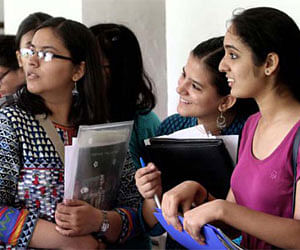
A non-profit organisation today called for doubling the spending on education and suggested overhaul of the key sector to improve quality and competition among institutes.
Education Promotion Society for India (EPSI), a not- for-profit autonomous body, demanded liberalisation of the important social sector.
"Our first and foremost request to the Union Government is that it should implement liberalisation policy in the education sector like it did in economic field in 1991," said G Vishwanathan, President of EPSI.
Addressing a press conference here, he said the need of the hour is to ensure there is no shortage of resources and infrastructure in the sector anywhere in the country. This will reduce the chances of agitation for reservation.
The former Member of Parliament said EPSI has submitted a charter of demands to ex-bureaucrat T S R Subramaniam, Chairman of the committee that is framing a new education policy for the Union HRD Ministry.
The Centre must allocate at least 8 per cent of GDP to education sector from 4 per cent now, Vishwanathan said.
"Currently, there is a big demand-supply gap in the medical education field. The Union Government should open one medical college in each district to overcome this gap. There are only 350 medical colleges in the country and they are not able to meet the demand of doctors." The Founder-Chancellor of VIT University said the Government should offer incentives to well-performing educational institutes. This would encourage competition among institutes and improve quality of education.
EPSI has been formed by a group of educationists, educational entrepreneurs, intellectuals, industry leaders and policy makers. It coordinates between Government and institutional operators, academia and industry, students and employers and national and international bodies committed to the advancement of education.
Education Promotion Society for India (EPSI), a not- for-profit autonomous body, demanded liberalisation of the important social sector.
"Our first and foremost request to the Union Government is that it should implement liberalisation policy in the education sector like it did in economic field in 1991," said G Vishwanathan, President of EPSI.
Addressing a press conference here, he said the need of the hour is to ensure there is no shortage of resources and infrastructure in the sector anywhere in the country. This will reduce the chances of agitation for reservation.
The former Member of Parliament said EPSI has submitted a charter of demands to ex-bureaucrat T S R Subramaniam, Chairman of the committee that is framing a new education policy for the Union HRD Ministry.
The Centre must allocate at least 8 per cent of GDP to education sector from 4 per cent now, Vishwanathan said.
"Currently, there is a big demand-supply gap in the medical education field. The Union Government should open one medical college in each district to overcome this gap. There are only 350 medical colleges in the country and they are not able to meet the demand of doctors." The Founder-Chancellor of VIT University said the Government should offer incentives to well-performing educational institutes. This would encourage competition among institutes and improve quality of education.
EPSI has been formed by a group of educationists, educational entrepreneurs, intellectuals, industry leaders and policy makers. It coordinates between Government and institutional operators, academia and industry, students and employers and national and international bodies committed to the advancement of education.








